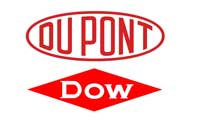Dow, DuPont merger gets greenlight from EU; sparks concern of monopoly in agro industry

Dow Chemical and DuPont earned the nod of the European Union for their US$130 billion merger by agreeing to sell substantial assets including key research and development activities.
The European Commission had been concerned that the merger of two of the biggest and oldest US chemical producers would leave few incentives to produce new herbicides and pesticides in the future. The deal is one of a trio of mega mergers that will reshape the industry and consolidate six companies into three.
Asset sales would ensure competition in the sector and benefit European farmers and consumers, the Commission said.
The two other big deals in the industry are ChemChina's US$43 billion bid for Syngenta and Bayer's acquisition of Monsanto.
Dow and DuPont said they were still on target for US$3 billion in cost synergies and US$1 billion in growth benefits.
The deal is still to be approved by regulators in the US, Brazil, China, Australia and Canada, but the companies said they were confident of clearance in all remaining jurisdictions.
With the EU approval, the US regulators are anticipated to follow suit because the agencies have traditionally coordinated on reviews and remedies for large multinational mergers, according to Diana Moss, President of the non-profit group American Antitrust Institute. She added, however, that any required asset sales would likely reflect antitrust concerns in the local marketplace.
Meanwhile, with the EU green light on, DuPont will divest large parts of its global pesticides business, including its global research and development organization.
The unit makes herbicides for cereals, oilseed rape, sunflower, rice and pasture and insecticides for insect control for fruits and vegetables.
Dow, in turn, will sell two acid co-polymer manufacturing facilities in Spain and the United States, as well as a contract with a third party through which it buys ionomers. The company has already found a buyer in South Korea's SK Innovation.
Lobbying group Friends of the Earth Europe criticised the EU decision, saying that the three deals would lead to three companies controlling about 70% of the world's agrichemicals and more than 60% of commercial seeds. The organisation furthered that allowing Dow Chemicals and DuPont to form the world's biggest agribusiness company will give giant corporations an even tighter toxic grip on our food and countryside. Dow, on the contrary, said that the agriculture company it planned to create with DuPont will be able to serve farmers better, helped by leveraging strong pipeline in its seeds and chemistry business, and competitive prices.
Barbara Patterson, Director of National Farmers Union, which represents 200,000 US farmers and ranchers echoed the group’s concern about the signal it will send for US approval. Sources said that ChemChina's bid for Syngenta could be approved anytime in the week but the timing could slip. Bayer and Monsanto are set to ask for EU approval in the coming months.
(PRA)Copyright (c) 2017 www.plasticsandrubberasia.com. All rights reserved.


















































